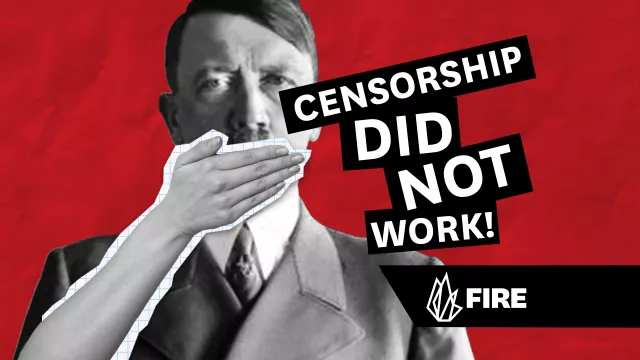Table of Contents
Censorship won’t cure disinformation (featuring Jacob Mchangama and Nadine Strossen): Part 17 of answers to arguments against free speech

In May 2021, I published a list of “Answers to 12 Bad Anti-Free Speech Arguments” with our friends over at Areo. The great Nadine Strossen — former president of the ACLU from 1991 to 2008, and one of the foremost experts on freedom of speech alive today — saw the series and offered to provide her own answers to some important misconceptions about freedom of speech. For this entry, I asked Jacob Mchangama, author of the excellent book, “Free Speech: A History from Socrates to Social Media,” to provide his answer.
Earlier in the series:
- Part 1: Free speech does not equal violence
- Part 2: Free speech is for everyone
- Part 3: Hate speech laws backfire
- Part 4: Free speech is bigger than the First Amendment
- Part 5: You can shout ‘fire’ in a burning theater
- Part 6: Is free speech outdated?
- Part 7: Does free speech assume words are harmless?
- Part 8: Is free speech just a conservative talking point?
- Part 9: Free speech fosters cultural diversity
- Part 10: Why 'civility' should not trump free expression
- Part 11: ‘New’ justifications for censorship are never really new
- Part 12: Free speech isn’t free with a carveout for blasphemy
- Part 13: Does free speech lead inevitably to truth?
- Part 14: Shouting down speakers is mob censorship
- Part 15: Is counterspeech the best answer to bad speech?
- Part 16: Would censorship have stopped the rise of the Nazis?
Assertion: Disinformation and misinformation about such vital topics as elections and COVID must be censored because it constitutes an existential threat to democracy and individual/public health.
Jacob Mchangama: What do the Catholic Church, England under Henry VIII, The Soviet Union, Nazi Germany, and the European Union have in common?
Certainly not much in terms of ideology, ethics, or philosophy. However, for all their fundamental differences each of these states and institutions have prohibited various forms of false information.
For centuries, the Catholic Church was preoccupied with stamping out heresy, which has its roots in the Greek word, “haíresis,” meaning “choice.” In the Middle Ages, heresy was defined as “an opinion chosen by human perception contrary to holy Scripture, publicly avowed and obstinately defended,” and could ultimately be punished by death. As late as 1832, Pope Gregory XVI warned that removing the restraints that keep men “on the narrow path of truth” was “a pestilence more deadly to the state than any other” and, therefore, the “evil” of “immoderate freedom of opinion, license of free speech, and desire for novelty” had to be countered at all costs.
England’s Henry VIII broke with the Catholic Church, making him the supreme head of both state and the Church of England. To cement his power Henry prohibited publications containing “open and manifest errors and slanders” contravening “the dignity and authority royal of the king's majesty and of his Imperial Crown.” Henry built on older precedents, since a “Scandalum Magnatum” act punishing “[F]alse News or Tales” scandalizing the king or “the Great Men of the Realm” had been enacted under Edward I in 1275.
While disinformation is a serious problem worthy of debate and countermeasures, censorship and repression is likely a cure worse than the disease.
Lenin and his fellow Bolsheviks were frequently imprisoned and exiled for their radical political opinions in Tsarist Russia. But once having established the Dictatorship of the Proletariat, Lenin had no intentions of being more permissive toward his own opponents. The first legislative act of the new regime was a Decree on the Press to suppress the “counter-revolutionary” press, including publications that “sow sedition through demonstrably slanderous distortion of facts.” According to Lenin, this draconian move was needed since “the bourgeois press is one of the most powerful weapons of the bourgeoisie” and “no less dangerous than bombs and machine-guns.” The press controls were supposed to be temporary, but instead they were expanded and made permanent, with repression of speech reaching its deadly climax under Stalin. Most recently, Putin’s Russia has revived the Soviet playbook and made it a crime punishable by up-to-15 years in prison for spreading intentionally “fake” news about the military.
On February 24, 1920, a leading member of the German Worker’s Party (DAP) read the party’s manifesto out loud. His name was Adolf Hitler, and his demands included “legal warfare against conscious political lying and its dissemination in the press.” In “Mein Kampf” — written while in prison — Hitler again accused the liberal press of being concerned only with “dig[ging] the grave for the German people and REICH” whereas the “lying Marxist Press” was spreading falsehoods to enslave the nation for the benefit of “international finance and its masters, the Jews.”

Would censorship have stopped the rise of the Nazis? Part 16 of answers to arguments against free speech from Nadine Strossen and Greg Lukianoff
Proponents of hate speech laws assume the enforcement of such laws might have prevented the spread of Nazi ideology in Germany, but the historical record belies this assumption.
According to Hitler, the state meekly allowed the media to hide behind “the principle of freedom of the Press and liberty of public opinion,” which permitted “poison to enter the national bloodstream and infect public life” with complete impunity. The solution was to bring the press under “state control” and free it from “the enemies of the people.” Shortly after Hitler assumed power through democratic means, the Nazis used constitutional means to expand existing emergency laws permitting the (Nazi) minister of the interior to ban publications that “contain obviously inaccurate news, the dissemination of which is likely to endanger vital interests of the state.”
And once the Nazis had pushed President Hindenburg to use the emergency provision of the Weimar Constitution to pass the so-called “Reichstag Fire Decree” to suspend civil liberties — including free speech — paving the way for a dictatorship, laws against “malicious gossip” were enacted, which made it a crime to spread rumors about or gossip against the government and its officials.
The European Union can trace its origins to the European Coal and Steel Community aimed at strengthening European integration and avoiding new and devastating wars and persecution like those unleashed by the Nazis. The European Union is committed to democracy and human rights and has a Charter of Fundamental Rights, which protects freedom of expression. However, in early March the EU banned Russian state-sponsored media outlets RT and Sputnik from broadcasting, as a response to these outlets’ nefarious pro-Kremlin disinformation and propagandistic coverage of the conflict in Ukraine. The ban also requires search engines like Google to delist all search results from Sputnik and RT, and an obligation for social media companies to block their accounts — as well as deleting the sharing and reproduction of RT and Sputnik content by other users.
While the scope, severity and consequences of all these laws against false information differ significantly, they are all aimed at protecting against certain forms of false information thought to be particularly dangerous to the fundamental values and institutions of the relevant polity, as defined by the very rulers or political leaders whom laws against false news will be protecting.
This is a lesson of which contemporary authoritarians are keenly aware. In 2021, 47 journalists were imprisoned on charges of spreading false news in countries like Myanmar, Egypt, Rwanda, and Ethiopia, according to data from the Committee to Protect Journalists. Moreover, since the onset of COVID, a “censorship pandemic” of laws has infected authoritarian states, which prohibits various forms of allegedly false information under the guise of protecting public health, while actually aimed at repressing dissent.

Is free speech outdated? Part 6 of answers to bad arguments against free speech from Nadine Strossen and Greg Lukianoff
The arguments for and against free speech continue to involve the same eternal, fundamental issues of principle that have been debated throughout history.
There is little reason to believe that things would be different in America should the Supreme Court decide to roll back landmark First Amendment cases like New York Times v. Sullivan, which now limits the government’s power to punish false statements about public issues, in order not to chill vigorous debate and criticism of public officials. The Sedition Act of 1798 showed that even luminaries of the Founding Generation, including Washington, Adams, and Hamilton, were willing to punish “false, scandalous, or malicious writings” against the government and Congress they dominated, and to use this law in a deeply partisan manner to target their Democratic-Republican opponents.
Those intolerant and tribalist impulses are still alive today. Donald Trump frequently demanded tougher laws against the “fake news media.” A 2017 poll showed that a plurality (45%) of Republicans agreed that courts should be able to “shut down” media outlets for “publishing or broadcasting stories that are biased or inaccurate,” with fewer than 20% of Democrats supporting this idea.
In 2021 — when Biden had become president — 65% of Democrats agreed that the government should do more to restrict false online information even if it limits freedom of information, whereas only 28% of Republicans were on board. We can be sure that Trump and Biden — as well as Democrats and Republicans — have conflicting ideas about what types of speech should be deemed “inaccurate” or “false” and who should be punished for peddling it.
So, while disinformation is a serious problem worthy of debate and countermeasures, censorship and repression is likely to be a cure worse than the disease.
Nadine Strossen: First Amendment principles permit the government to punish false speech when it directly, immediately causes specific serious harm. Important examples of punishable false speech include defamation, fraud, and perjury. The term “disinformation” (or “misinformation”) has no specific legal meaning, but is widely used to designate false or misleading speech that cannot constitutionally be punished precisely because its potential harms are indirect and speculative.
As current debates illustrate, one person’s cherished truth is someone else’s despised or feared “fake news.” Speech that critics seek to suppress as disinformation almost never consists of objectively verifiable facts alone, but rather, also involves subjective matters of interpretation and analysis. After all, speakers who intentionally or recklessly utter false factual statements may constitutionally be punished under existing laws such as those against fraud. In contrast, though, the Supreme Court has ruled that “[u]nder the First Amendment there is no such thing as a false idea. However pernicious an opinion may seem, we depend for its correction . . . on the competition of other ideas.”
Most vulnerable would be ideas that challenge government policy.
If government were permitted to determine which ideas should be punishable as “false,” most vulnerable would be ideas that challenge government policy. Until the Supreme Court’s historic 1964 decision reining in the concept of punishable defamation, Southern officials systematically pursued multiple defamation lawsuits against both civil rights activists and national media outlets for even insignificant factual inaccuracies, with the specific goal of stifling both groups. In short, the pre-1964 libel law, which permitted government to punish disinformation, was weaponized against the government’s critics.
To this day, expression by racial justice advocates continues to be assailed as disinformation. For example, a May 2021 NPR story quoted Mike Gonzalez, a senior fellow with the Heritage Foundation, as stating: “I feel that Black Lives Matter is one of the greatest sources of disinformation. . . They have manipulated the good nature of many people.”

Free speech is for everyone: Part 2 of answers to bad arguments against free speech from Nadine Strossen and Greg Lukianoff
The inherent problems with censoring disinformation specifically plague recent laws that are touted as restricting pandemic-related disinformation. The Economist reported in February 2021 that “[c]ensorious governments are abusing fake news laws,” invoking the pandemic as “an excuse to gag reporters” and to silence critics of their anti-pandemic policies. Given the inescapable elasticity of the concept of disinformation, restrictions on it can easily be wielded against important information, even in democratic countries. Throughout the pandemic, we have witnessed constantly evolving and shifting views among expert individuals and agencies, as they steadily gather and analyze additional data. Yesterday’s life-endangering disinformation can — and has — become today’s life-protecting gospel. As one example, recall the CDC’s changing edicts about mask-wearing.
Because of these unavoidable problems, in 2020, the ACLU brought a lawsuit against Puerto Rico’s laws targeting pandemic-related disinformation. The complainants are two prominent investigative journalists, who explained that “developing stories on matters of immense public concern are often complex, contentious, and murky,” so that “inadvertent inaccuracies are inevitable even in the most thoroughly vetted reporting.”
Multiple studies have concluded that the most fruitful anti-disinformation tool is accurate information that can check its spread and influence: targeted responses to specific disinformation, as well as preemptive general educational approaches, and enhancing critical media skills. Psychological research shows that even more effective than debunking disinformation after its dissemination is “prebunking”: inoculating people against disinformation before they are exposed to it.
In contrast with censorship, these "counterspeech" / "more speech" strategies not only are more compatible with free speech and democracy; they are also more effective in promoting truth.
Recent Articles
Get the latest free speech news and analysis from FIRE.

VICTORY: Court vindicates professor investigated for parodying university’s ‘land acknowledgment’ on syllabus

Can the government ban controversial public holiday displays?

DOJ plan to target ‘domestic terrorists’ risks chilling speech
